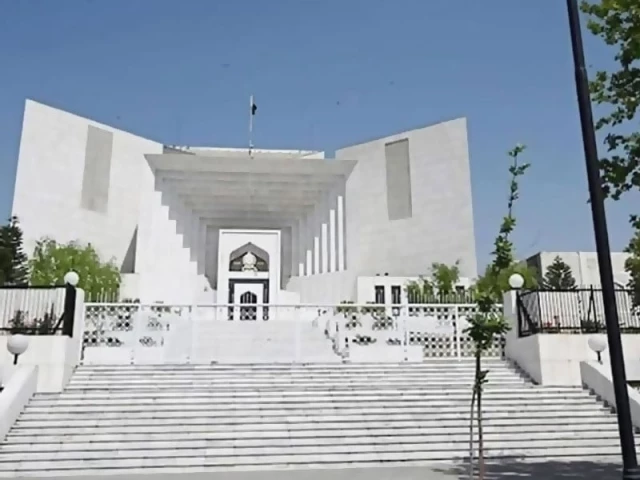Alarms over the 27th constitutional tweak
Legal fraternity divided over proposed tweak as it still debates 26th Amendment

While the federal government has yet to formally move ahead with the 27th Constitutional Amendment, murmurs of discontent and debate have already taken root within the legal fraternity as the Supreme Court resumes hearings on review petitions challenging the July 12 order in the reserved seats case.
Tensions escalated further when Islamabad High Bar Association (IHCBA) President Wajid Gilani came out in support of the proposed amendment, hailing it as an opportunity for much-needed "structural reforms" in the superior judiciary.
However, the Karachi Bar Association (KBA) fired back, condemning Gilani's stance and warning that lawyers from Sindh would "strongly resist, by any means necessary, any attempt to reintroduce martial law and impose this judicial one-unit scheme upon the federation of Pakistan".
'Post-constitutional order'
Weighing in, former additional attorney general Tariq Mahmood Khokhar pointed out that the original draft of the 26th Amendment had already been significantly revised under duress.
"In the face of opposition, to the chagrin of the Established Order, many of its amendment clauses had to be dropped from the final draft. But they were not abandoned as a lost cause," Khokhar said.
He argued that the current political climate is "propitious" for reintroducing those previously omitted provisions through the 27th Amendment.
"Victory on the battlefield can be seductive. Opposition is almost invariably a daunting task in Pakistan. More so now than ever before. Even otherwise, controlled institutions, lacking public legitimacy, unrepresentative legislatures and executives, the mainstream media and the legal fraternity are vying for collaboration."
Khokhar warned that these dormant clauses could now return with ease, asserting that the 26th Amendment had already propelled Pakistan into a "post-constitutional order".
"The proposed 27th Amendment will 'formally' replace the already diminished rule of law with rule by law (law as an instrument of control). Expect reintroduction of military courts, a federal constitutional court, revamped judicial commission, redefined provincial powers, diminished judiciary, curtailment of the fundamental rights, marginalisation of the constitutional institutions, an authoritarian presidential system and more," he said.
"The supreme tragic irony is that the intended victims are, with rare honourable exceptions, willing accomplices in and apologists for offences against the constitution and democracy," Khokhar warned.
Meanwhile, lawyers have begun to question why the committee of constitutional benches, led by Justice Aminuddin Khan and comprising Justice Jamal Khan Mandokhail and Justice Muhammad Ali Mazhar, has not yet fixed hearings on petitions against the 26th Constitutional Amendment, as it moves swiftly on the reserved seats case – a matter deemed crucial for enabling the ruling coalition to secure two-thirds majority in Parliament.
Observers note that the constitutional bench appears eager to wrap up the proceedings on the reserved seats case without delay. However, questions are being raised over whether such haste risks undermining judicial independence, a salient feature of the Constitution.
Moreover, the very formation of the constitutional bench is itself under scrutiny. A section of the legal community alleges that those who benefited from the 26th Amendment are hesitant to adjudicate its legal challenges.
In 2015, a majority of SC judges, in the landmark 21st Constitutional Amendment case, had held that the parliamentary form of government was a salient feature of the Constitution and could not be amended via constitutional amendment.
Justice (retd) Sheikh Azmat Saeed authored the judgment, which was endorsed by eight judges.
According to the verdict, the constitution contains a scheme that reflects its salient features.
"In an effort to discover such salient features, material outside the Constitution cannot be safely relied upon. The salient features are ascertainable from the Constitution including democracy, the parliamentary form of government and independence of the judiciary," the ruling read.
It further stated that Parliament's power to amend the Constitution was subject to implied limitations. As per Articles 238 and 239, Parliament may amend the Constitution, provided that the salient features are not repealed, abrogated, or substantively altered.
The judgment also affirmed that the apex court is vested with jurisdiction to interpret the Constitution and to determine whether any constitutional amendment violates its defining features.
While the majority judgment remains in force, legal circles maintain that there was still a pressing need for the top court to examine the validity of the 26th Constitutional Amendment.
They caution that further delay in adjudication could open the door for additional constitutional amendments, potentially threatening the Constitution's foundational principles.
Meanwhile, in its strongly worded statement, the Karachi Bar Association expressed dismay over IHCBA President Gilani's public endorsement of an amendment "as yet unknown to the nation at large".
"The lawyers and the people of Pakistan expect Bar Associations and Bar Councils to be independent voices. They must not act as proxies on behalf of the Government and be used to throw out feelers on the Government's behalf and declare support and rubber-stamp constitutional amendments that are yet to even see the light of day."
The KBA argued that making such statements while the legal community continues to grapple with the consequences of the 26th Amendment, which has not only been rejected by the legal community at large but is also sub judice, was "entirely unwarranted".
"If indeed there is any such Amendment on the anvil and the Government has seen fit to secretly share its contents with the IHCBA President; he should share the same with his actual constituents – which is the legal community."
"The news is also being spread that such Amendment will include a requirement of fresh oath for superior court judges. This is a transparent attempt to intimidate the few judges left who are yet to surrender their conscience at the feet of the government. It is identical to the PCO oaths invented by General Zia and General Musharraf for this very purpose and any civilian and legal/judicial collaborators in this martial-law exercise shall surely be remembered in the same terms as Sharifuddin Pirzada and Abdul Hameed Dogar," the statement further read.
"In any event, to the extent the learned IHCBA President has announced support for constitutional amendments that would allow High Court and Lower Court judges from Islamabad to be transferred and posted in the different provinces (with or without their consent); the Karachi Bar Association considers this not only an attack on judicial independence but an attack on federalism and the autonomy and independence of provincial judiciaries."
"Let there be no doubt, the lawyers of Sindh strongly reject and shall resist, by any means necessary, any attempt to reintroduce martial-law and impose this judicial One-Unit scheme upon the Federation of Pakistan," the association warned.




















COMMENTS
Comments are moderated and generally will be posted if they are on-topic and not abusive.
For more information, please see our Comments FAQ